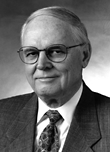
Ray Marshall’s extraordinary life began quite humbly on a cotton farm outside Oak Grove, Louisiana in 1928. At age 11, Dr. Marshall and his four younger siblings were sent to live in a Mississippi orphanage after their mother passed away. He dropped out of school in the eighth grade and went to work at a laboratory making dentures. At age 15, he joined the Navy and served in the Pacific during World War II.
After the war, Dr. Marshall attended Hinds Junior College with assistance from the G.I. Bill. He transferred to Millsaps College where he received a B.A. in economics and business administration. Dr. Marshall went on to earn a master’s degree from Louisiana State University and a Ph.D. in economics from the University of California at Berkeley. His early work focused on comparative labor movements, which led to research in Finland as a Fulbright Scholar and as a Wertheim Fellow at Harvard University
Dr. Marshall taught for several years at the University of Mississippi and Louisiana State University. In 1962, he came to The University of Texas at Austin where he further specialized on issues that would guide the remainder of his career – jobs creation, discrimination in employment, reform in education, job training, poverty prevention, and immigration. In June 1970, Dr. Marshall formed the Center for the Study of Human Resources, which was later renamed in his honor.
Dr. Marshall served as U.S. Secretary of Labor during the Carter administration. Under his leadership, the Department of Labor played a major role in the president’s economic stimulus program by expanding public service employment and job training programs. Other highlights of his tenure include the movement of the Mine Safety and Health Administration into the Labor Department, strengthening of the Occupational Safety and Health Administration and pension protections, and consolidation of federal equal employment opportunity programs under the Office of Federal Contract Compliance Programs. He also had responsibility for immigration, foreign worker programs, and the creation of the Select Commission on Immigration and Refugee Policy. After serving a full four-year term as secretary, Dr. Marshall returned to The University of Texas in 1981.
Dr. Marshall is author of more than 30 books and monographs and has served on numerous task forces and commissions. He was a founding member of the Economic Policy Institute, served as a member of the Clinton Administration’s National Skills Standards Board, the Advisory Commission on Labor Diplomacy and the Commission on the Future of Labor-Management Relations, chaired the Commission on the Skills of the American Workforce, and chaired the National Center on Education and the Economy.
Dr. Marshall retired from teaching in 1998 but remains involved at The University of Texas at Austin by serving as a Professor Emeritus, holding the Audre and Bernard Rapoport Centennial Chair in Economics and Public Affairs, and chairing the Ray Marshall Center’s Advisory Committee. In addition, he continues to write articles and books, advise government leaders around the world, and work to make a positive difference in the lives of working people.


Leave a Reply